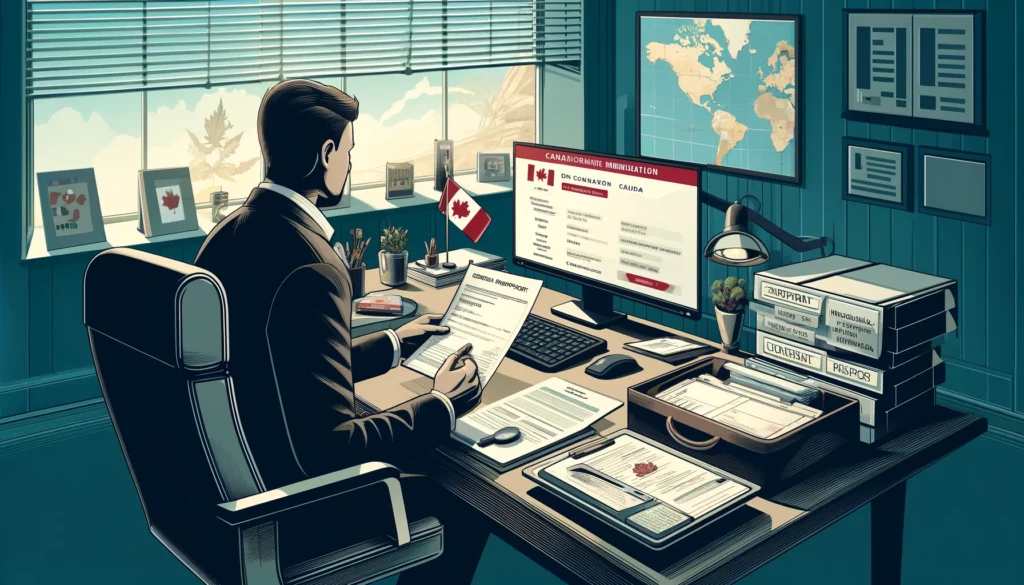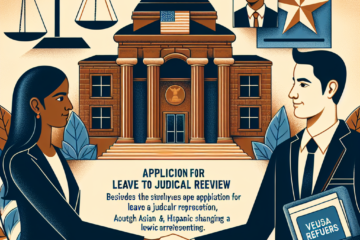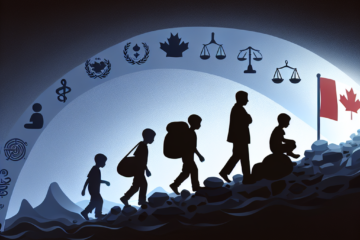Table of contents
- Understanding Entry Refusal: The Basics
- Documentation and Eligibility Issues
- Security Concerns and Criminality
- Health Risks
- Misrepresentation
- Non-compliance with IRPA
- The Aftermath of Refusal
- Impact on Future Travel
- Detention and Removal
- Legal Representation and Appeals
- Preparing for Entry: Tips and Advice
- FAQs on Being Refused Entry to Canada
- Pax Law can help you!
Traveling to Canada, whether for tourism, work, study, or immigration, is a dream for many. However, arriving at the airport only to be refused entry by Canadian border services can turn that dream into a confusing nightmare. Understanding the reasons behind such refusals and knowing how to navigate the aftermath is crucial for anyone who faces this daunting situation.
Understanding Entry Refusal: The Basics
When a traveler is refused entry at a Canadian airport, it’s typically due to issues flagged by the Canada Border Services Agency (CBSA) officers. These issues might relate to documentation, eligibility, security concerns, health risks, misrepresentation, or non-compliance with Canada’s immigration laws. Each refusal case is unique, and the specific reason for denial can significantly affect your next steps.
Documentation and Eligibility Issues
One of the most common reasons for entry refusal is issues with documentation and eligibility. This could include improper or incomplete visa applications, expired passports, or not having sufficient funds to prove you can support yourself during your stay in Canada. It’s essential to double-check all your documents before travel and ensure they meet the criteria outlined by Immigration, Refugees, and Citizenship Canada (IRCC).
Security Concerns and Criminality
Canada takes its security very seriously. If there are any concerns related to security or a criminal background, you might find yourself being refused entry. This includes having a criminal record, being involved in criminal or terrorist activities, or being considered a security risk to the country. Even DUIs or minor criminal offenses in your home country can pose a problem.
Health Risks
Public health concerns are another area that can impact your ability to enter Canada. If you’re not up to date with required vaccinations or if you pose a health risk to the Canadian public (such as carrying a contagious disease), you might be denied entry. It’s crucial to understand the health requirements before traveling.
Misrepresentation
Providing false information or documents to IRCC or to border officers can result in a refusal. Misrepresentation includes lying on your application, hiding important information, or presenting false documents. The consequences of misrepresentation are severe and can include a ban on entering Canada for several years.
Non-compliance with IRPA
Violating any part of the Immigration and Refugee Protection Act (IRPA) can also lead to refusal at the border. Previous overstays in Canada or not adhering to the conditions of a previous entry could be grounds for denial.
The Aftermath of Refusal
Being refused entry can be disheartening, but it’s important to know what steps you can take afterward.
Impact on Future Travel
A refusal can impact your future ability to travel to Canada. It may necessitate obtaining a Temporary Resident Permit (TRP) if you are found inadmissible but have a justifiable reason to travel to Canada. It’s important to address any issues that led to your refusal before attempting to re-enter Canada.
Detention and Removal
In some cases, individuals refused entry may be detained for further investigation or deported back to their home country. This could also include a ban on re-entering Canada for a certain period, depending on the severity of the issue.
Legal Representation and Appeals
After being refused entry, you might have the option to appeal the decision or seek a review of your case through legal channels. This process can be complex and often requires the assistance of a legal expert specializing in Canadian immigration law. Although this can be costly and time-consuming, it’s sometimes necessary to overcome the refusal.

Preparing for Entry: Tips and Advice
- Double-Check Your Documents: Ensure all your documents are in order, valid, and complete. Pay special attention to visa requirements and expiry dates.
- Understand the Requirements: Familiarize yourself with Canada’s entry requirements, including health and security regulations.
- Be Honest: Always provide accurate information on your applications and to border officers. Misrepresentation can have long-term consequences.
- Seek Legal Advice if Necessary: If you’re facing issues or have been refused entry before, consulting with an immigration lawyer might be beneficial.

Being refused entry at a Canadian airport can be a stressful experience, but understanding the reasons behind the refusal and knowing the available options can make a significant difference. Whether it’s ensuring your documents are in order, addressing any potential issues before travel, or seeking legal assistance, there are steps you can take to mitigate the impact of a refusal. Remember, preparation, honesty, and understanding the legal framework are your best tools when navigating the complex process of entering Canada.
FAQs on Being Refused Entry to Canada
You can be refused entry to Canada for several reasons, including incomplete or incorrect documentation, security or criminality concerns, health risks, misrepresentation, or non-compliance with the Immigration and Refugee Protection Act (IRPA). Each case is unique, and the specific reason for refusal will be communicated to you by the border services officer.
If you are refused entry, the first step is to understand the reason for the refusal as provided by the CBSA officer. Depending on the reason, you might need to correct documentation errors, address admissibility issues, or seek legal advice for more complex situations, such as appeals or applying for a Temporary Resident Permit (TRP).
Yes, in some cases, you can appeal a refusal decision. The appeal process depends on the nature of the refusal. For some decisions, you might need to address the issue and reapply, while for others, such as misrepresentation, you may need to appeal to the Immigration Appeal Division. Consulting with an immigration lawyer can provide guidance specific to your situation.
A refusal can affect your future travel to Canada by necessitating additional documentation or steps for re-entry. Depending on the reason for refusal, you might be required to obtain a TRP or address issues of inadmissibility before attempting to enter Canada again.
Yes, certain circumstances, such as serious criminality, security risks, or misrepresentation, can lead to a ban from entering Canada for a specific period or permanently. The length of the ban depends on the severity of the issue and the discretion of the immigration authorities.
A Temporary Resident Permit (TRP) allows individuals who are otherwise inadmissible to Canada for a specific reason to enter or stay in the country temporarily. You might need a TRP if you have a criminal record, health issues, or any other inadmissibility issue but have a valid reason to travel to Canada. Obtaining a TRP involves demonstrating that your visit is justified despite the inadmissibility.
Correcting a misrepresentation can be challenging, but it’s not impossible. If you made a genuine mistake on your application or at the border, you should provide evidence of the mistake and clarify the correct information. However, if the misrepresentation is considered fraudulent, you might face a ban and would need legal advice to address the issue.
While not every refusal case requires a lawyer, legal advice can be beneficial, especially for complex situations such as appeals, addressing inadmissibility, or applying for a TRP. An immigration lawyer can provide expert guidance tailored to your specific situation.
Yes, health issues that pose a risk to public health or safety, or that might cause excessive demand on Canada’s health or social services, can lead to refusal of entry. It’s important to disclose any health issues and provide relevant medical documentation when applying for entry to Canada.
Preventing a refusal involves careful preparation and honesty. Ensure all your documentation is complete, accurate, and up-to-date. Understand and comply with Canada’s entry requirements, including health and security regulations. If you have any issues that might affect your admissibility, address them before traveling and consider seeking legal advice.
Pax Law can help you!
Contact Samin Mortazavi at Pax Law Corporation, where expertise and dedication converge to resolve your immigration legal needs. With a profound understanding of Canadian immigration law and a commitment to personalized legal representation, Samin Mortazavi offers strategic guidance and advocacy for navigating complex immigration processes. Whether it’s applying for visas, handling immigration appeals, or advising on compliance issues, Pax Law Corporation is your trusted partner in managing your immigration matters. Secure your future in Canada by reaching out to Samin Mortazavi today.
Our lawyers and consultants are willing, ready, and able to assist you. Please visit our appointment booking page to make an appointment with one of our lawyers or consultants; alternatively, you can call our offices at +1-604-767-9529.



0 Comments